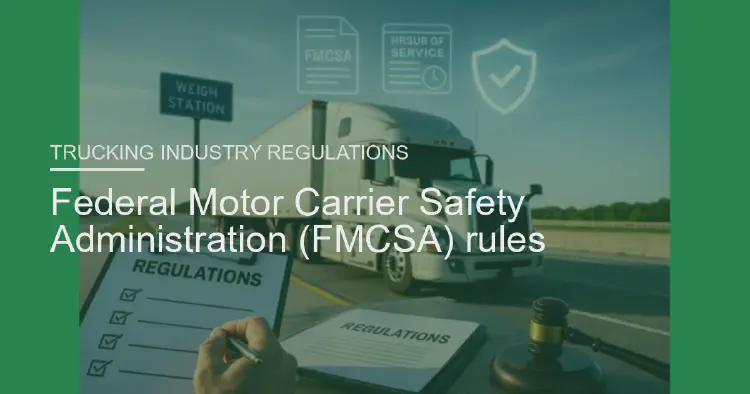Federal Motor Carrier Safety Administration (FMCSA) rules
The Federal Motor Carrier Safety Administration (FMCSA) is the central authority for trucking regulation in the United States. Its rules are designed to reduce crashes, injuries, and fatalities involving large commercial vehicles.
- Truck Accident Law Team
- 2 min read
Article 1 of 5 in Trucking Industry Regulations/

Federal Motor Carrier Safety Administration (FMCSA) Rules
Purpose and Scope
- Established in 2000 under the U.S. Department of Transportation (DOT).
- Oversees interstate commercial trucking, setting nationwide safety standards.
- Applies to trucking companies, commercial drivers, and vehicle operators engaged in interstate commerce.
Core Areas of FMCSA Regulation
-
Hours of Service (HOS)
- Limits driving hours to combat fatigue.
- Requires rest breaks and off-duty periods.
- Electronic Logging Devices (ELDs) are mandatory to track compliance.
-
Driver Qualifications
- Drivers must hold a valid Commercial Driver’s License (CDL).
- Medical fitness exams required.
- Background checks for prior violations and drug/alcohol issues.
-
Vehicle Standards and Maintenance
- Regular inspections, maintenance logs, and repair requirements.
- Trucks must meet safety standards for brakes, lights, tires, and cargo securement.
-
Drug and Alcohol Testing
- Pre-employment, random, and post-accident testing mandated.
- Drivers who test positive are immediately removed from service.
-
Cargo Securement Rules
- Standards for tying down and distributing loads safely.
- Prevents accidents caused by shifting or falling cargo.
-
Insurance and Financial Responsibility
- Sets minimum insurance requirements for trucking companies.
- Ensures carriers can cover damages from accidents.
Enforcement
- The FMCSA works with state agencies to conduct roadside inspections and compliance reviews.
- Violations can result in fines, license suspensions, or company shutdowns.
Legal Relevance
- FMCSA violations often play a central role in truck accident litigation.
- Proof of non-compliance can establish negligence and strengthen victims’ claims.
Summary: FMCSA rules form the backbone of U.S. trucking regulation. They cover every aspect of commercial trucking—from driver fitness to vehicle safety—and play a pivotal role in both accident prevention and legal accountability.
You might also like:
- Tags:
- Trucking Companies
- Hours Service
- Accident Litigation
- Maintenance Logs
- Drug Alcohol
- Electronic Logging
- Service Hos
- Safety Standards
- Alcohol Testing
- Devices Elds
- Logging Devices
- Fmcsa Rules
- Safety Administration
- Cargo Securement
- Insurance Requirements
- Establish Negligence
- Driving Hours
- Legal Relevance
- Hos Limits
- Result Fines
- Commercial Driver
- Commercial Drivers
- Department Transportation
- Administration Fmcsa
- Carrier Safety
- Federal Motor
- Motor Carrier
- Interstate Commerce
- Violations Result
- Driver License
- License Cdl
- Transportation Dot
- Commercial Trucking
- Cargo Insurance
- Accidents Caused
- Securement Rules
- Post Accident
- Truck Accident Litigation
- Hours Service Hos
- Electronic Logging Devices
- Logging Devices Elds
- Drug Alcohol Testing
- Violations Result Fines
- Commercial Driver License
- Driver License Cdl
- Carrier Safety Administration
- Federal Motor Carrier
- Motor Carrier Safety
- Safety Administration Fmcsa
- Department Transportation Dot
- Cargo Securement Rules
- Service Hos Limits
- Random Post Accident
- Post Accident Testing
- Role Truck Accident
- Drivers Test Positive
- Minimum Insurance Requirements
- Brakes Lights Tires
- Company Shutdowns Legal
- Maintenance Logs Repair
- Shutdowns Legal Relevance
- Accidents Caused Shifting
- Service Cargo Securement
- Shifting Falling Cargo